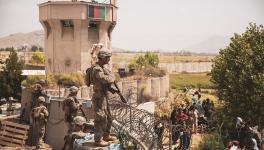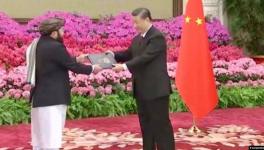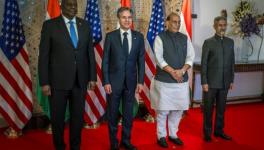Afghan Women Athletes: Prisoners in Their Own Homes
Friba Rezayee continues to appeal to sports federations to put pressure on the Taliban
"I wish I didn't exist," Afghan athlete Amira (name changed) writes. "I didn't do anything wrong. The only crime I have committed is to play sports."
Before the Taliban took power in Kabul in August 2021, Amira was one of the best judo fighters in the country. A few weeks ago, the Taliban raided her home for documents that would prove the young woman had been a member of the Afghan national team.
"Fortunately, she was able to escape. She hid in a local cemetery for the whole day, praying that the Taliban would not find her there," Friba Rezayee tells DW. "Had they found these documents in her house, she would have been tried in a Sharia court. That would have meant she would have either received 100 lashes or even been publicly executed."
Rezayee was once a successful judoka herself in Afghanistan. She and track and field sprinter Robina Muqim Yaar became the first women ever to compete for Afghanistan in the Olympics in Athens in 2004.
"That was a sports revolution," Rezayee recalls. In 2011, she fled Afghanistan for Canada. There, the 36-year-old founded the aid organization Women Leaders of Tomorrow (WLT), which provides higher education to female refugees from Afghanistan.
With its GOAL (Girls of Afghanistan Lead) sports program, the organization also supports Afghan women in martial arts. Rezayee keeps in touch with around 130 Afghan female athletes who were not able to escape the country after the Taliban took power.
Aghanistan's female judo team in training shortly before the Taliban took power
Threats from Kabul
These women continue to hide in their homes, "waiting, in a sense, for the Taliban to knock on the door and arrest them," Rezayee says. "The Taliban have sent them threatening letters. They've been intimidate and they can't go outside."
Judoka Amira describes the athletes' dramatic situation this way, "We don't need a prison for women in Afghanistan. Our houses have become prisons for us." Afghanistan, says Mina (name changed), another judoka who remained in the country, "has become a fatherless country where violent children have the power to do whatever they want with women and girls."
The Taliban have not yet officially banned women's sports by law. During the first Taliban rule from 1996 to 2001, the International Olympic Committee (IOC) had excluded Afghanistan from the 2000 Games in Sydney, partly because the radical Islamists discriminated against female athletes.
This attitude of the Taliban has not changed, Rezayee says. "According to their interpretation of Sharia law, women's sports are a sin. They believe that sexual signals are sent to men because a woman's body is visible during physical activity. Women are not even allowed to exercise in a gym."
There is a climate of intimidation and fear in Afghanistan, she explains. For example, a player on the Afghan national volleyball team was recently arrested and "the Taliban brutally beat her up. She had terrible bruises all over her body. The Taliban let her live because they wanted to show other female athletes what happens to them when they play sports."
Armed Taliban soldiers patrol the training room of the judo team
'The world forgets about Afghanistan'
Rezayee and her staff at WLT are still trying to get Afghan female athletes out of the country and to safety. But even if they succeed, there is the question of where the women can then stay.
The Canadian government, for example, focuses its refugee policy on former local Afghan forces of the Canadian army and their families, thus excluding female athletes. "Even in Europe, it's tremendously difficult to get entry visas for them," Rezayee says. The Ukraine war makes things even more complicated. "All the world's attention is focused on the Ukrainian refugees. And the world is forgetting about Afghanistan."
The Afghan sports pioneer feels abandoned by the major sports organizations. Rezayee believes the path of "quiet diplomacy" with the Taliban that federations like the IOC are promoting is wrong.
"If they legitimize it, the Taliban will win. That will set a historical precedent: Evil wins. But we want the principles of sport, education and human rights to win over the men with the guns."
Not enough pressure
After the Taliban took power eight months ago, only the ICC, the world cricket governing body, had threatened to expel Afghanistan because of its stance on women's sports. But eventually, even the ICC eased its position.
Now the federation is apparently playing for time: It will "continue to support the Afghan men's team to play international cricket while monitoring the direction of the sport in the country, including the development of the women's game," it said after a board meeting in Dubai in early April.
Amira (name changed) hid from the Taliban in a cemetery
Rezayee cannot understand the reluctance of sports federations to act. "Now is the perfect time to exert pressure: without girls' education and without women's sports, there is no legitimacy," the exiled Afghan with a Canadian passport demands. International pressure could also make a difference with Afghanistan's radical rulers, she adds.
"Because as much as the Taliban are married to their ideology, they are very sensitive to what people think about them. They are very brutal, they are evil. But they are also not stupid. They are aware that the world is watching them, especially people on social media."
The last light bulb
Giving up is out of the question for Rezayee, even though she often receives threats from her home country. "I'm used to that," she rebuffs. She continues to fight because she feels committed to her fellow countrywomen who play sports.
"Whenever they call me or send me a message from Afghanistan, they cry and are inconsolable. Their courage to live is dying," Rezayee says.
"When an athlete loses her motivation, it's like you take away a mother's child. The work that we are doing, and that I am also asking the international community to do, is not only to save the lives of female athletes in Afghanistan, but also to keep their hope alive. Hope is the last light bulb left burning. We must not let this light go out."
This article has been translated from German.
Get the latest reports & analysis with people's perspective on Protests, movements & deep analytical videos, discussions of the current affairs in your Telegram app. Subscribe to NewsClick's Telegram channel & get Real-Time updates on stories, as they get published on our website.



























